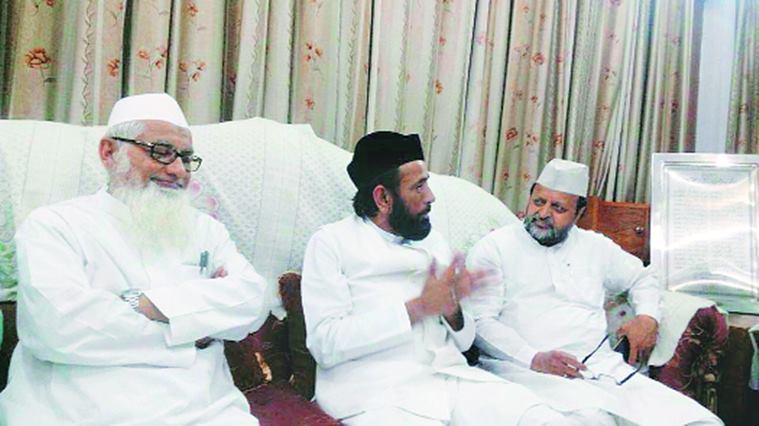The Barelvi Statements
Wiki Article
All about Barelvi
Table of ContentsBarelvi Things To Know Before You BuySome Known Factual Statements About Barelvi Not known Details About Barelvi The Only Guide for Barelvi
Radical Islamist groups in South Asia such as the Taliban are frequently classified as Wahhabis, belonging to the ascetic, puritanical kind of Islam institutionalised in Saudi Arabia. But while the ties in between the Wahhabis and also the Taliban are tight, the latter really come from a different branch of the belief.Sunni Islam is split into four orthodox institutions of legislation (Madhhabs), each of which is complied with in distinctive components of the Muslim world. A number of rites and also petition kinds likewise differ amongst the schools. As the map over shows, Wahhabism, based in Saudi Arabia, is connected with Hanbali legislation, the strictest type of Islamic law.

" Sunni Muslims," Haqqani creates, have actually discarded their hostility to Wahhabi teams, creating a a great deal of typical Sunnis who accept Wahhabi political and also jihadi concepts without always surrendering their rites and routines." As is often noted, Saudi Arabian spiritual funding has actually helped damage down the obstacles between the 2 sects.
The Only Guide to Barelvi
Mapping the four standard institutions of Sunni Islamic regulation is reasonably simple, although the authors of the Wikipdia map published over are entitled to commendation for doing a specifically great work. But the differences that actually issue are not those of Madhhab, but rather are located amongst less formal and much more recent "motions" within Islamic idea and also practice.The Deobandi movement is straightened with Wahhabism and also developments a just as rough, puritanical analysis of Islam. The Barelvi motion, in contrast, defends an extra typical South Oriental version of the faith fixated the techniques of Sufi mysticism. In India and also particularly Pakistan, stress between both teams can be intense, often verging on open war.
As recently reported in the, "When the Taliban took control of Buner in April 2009, they first besieged Pir Baba's temple. Taliban leader Fateh Khan stated it was because the location was a hub of 'infidelity as well as idolatry.'" Consequently, numerous Sufi temples are now greatly protected by Pakistani security pressures.
One can, nevertheless, easily depict their location of origin, as both activities are named for towns in north India: Deoband and Bareilli. Although extreme Deobandi groups are most closely connected with Pakistan and Afghanistan, the motion's intellectual and spiritual heart is still the Indian city of Deoband. Its Darul Uloom Deoband is deemed to be the 2nd biggest madrasah (religious institution) in the Sunni Muslim globe, following only Al-Ahzar in Cairo.
3 Simple Techniques For Barelvi
Strong numbers are difficult to locate, the majority of professionals preserve that Barelvis substantially out-number Deobandis not just among Indian Muslims yet in Pakistan., "some 15 per cent of Pakistan's Sunni Muslims would certainly consider themselves Deobandi, as well as some 60 per cent are in the Barelvi custom.Early Deobandi leaders were distressed by the triumph of British colonialism and also English-language education and learning, which they sought to visit our website fight by purifying their faith, removing away mystical practices and also other innovations that they viewed as unlike the confidence (Barelvi). One of the most hardline Deobandis involved pertain to Barelvis, along with Shiites, as non-Muslim challengers deserving of assault.
Deobandi thinking is too traditional to be patriotic, pertaining to the neighborhood of the faithful, not the contemporary nation-state, as the proper Quranic political vehicle. Most Deobandi scholars denied the dividers of British India in 1947, liking to look for the spread of Islam in an undivided India. The idea of Pakistan, moreover, was originally welcomed by Muslim teams disliked by the hardline Deobandis (Barelvi).
As an outcome, the Pakistani government significantly veered in the instructions of the severe Deobandi activity. The connection, nonetheless, is a two-edged sword for modern-day Pakistan, as the Deobandi web faithful eventually have contempt for nationwide identifications and borders.
Barelvi Fundamentals Explained
Doubters connect it to terrorist companies; the Taliban, besides, got up of Deobandi madrasahs in northeastern Pakistan, as did a number of other violence-prone organizations. Outrageous fatwas (religious rulings) do not help its reputation. In May 2010, a decree that women can not function for wages shocked mainstream Muslim viewpoint worldwide. (The described it as a "Talibanesque fatwa that reeked of tribal patriarchy.") A lot more humiliating was the 2006 "fatwas for cash money" bribery rumor, which was revealed by an Indian tv sting operation.
As his explanation Abedin creates: On the question of so-called Wahabism I place it to Madrassi that several movie critics of the Deoband seminary claim that Deobandi beliefs are simply a small action away from full-blown Wahabism. In feedback the deputy Vice Chancellor makes a clear demarcation in between both institutions of thought, before adding that if we consider the Wahabis and also the Barelvis as two extremes, the Deobandis inhabit the centre ground in that continuum.
Report this wiki page